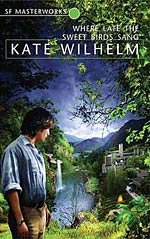
![]() gloker
gloker
2/27/2013
![]()
Where Late the Sweet Birds Sang by Kate Wilhelm is a post-nuclear-apocalypse American novel written with subtlety and lyricism. The first chapter succinctly, but warmly introduces an extensive Virginian farming clan with which the author demonstrates her poetic writing. A talent that brought to my mind James Agee's American small town homage in his "Knoxville: Summer of 1915". In this first chapter Kate Wilhelm also skillful foreshadows upcoming problems with, among other elements, an "incestuous" love between cousins and an unwelcome coming of age ritual with a drink of the first "martini".
Alert readers might recognize that the novel and first section's title both come from a Shakespeare sonnet ("Sonnet #73"), while the second section is a reference to the folk song "Shenandoah", and the final section contains an epigram from a T.S. Elliot poem ("Four Quartets"). If unfamiliar, and a reader makes the effort to look these up, the seeker is rewarded with a bit more insight to the novel's queries- but such research is not necessary to enjoy overall this crafted storytelling .
This slender novel (only about 250 pages) encompasses a little bit of every style of story conflict: self vs society, self vs environment, self vs self. So there is adventure, romance, tragedy and comedy, and, significantly, tightly woven into it all, are issues of politics, philosophy, and ethics. Wilhelm can do this because she creates mostly well drawn characters across time spans and that jump generations, but all readers should be attentive- because she can suggest much of her probings through artful implications and delicate insinuations. One aspect that I enjoyed the most about this SF Hugo Award and Locus Award winner was how clearly Wilhelm trusted her readers.
This novel was published in 1976, back when the notion of nuclear war and the struggle for disarmament were a lot fresher and more urgent than they may seem today. Still the novel's premise of how surviving a nuclear holocaust might be attempted does not read so outdated. Wilhelm sets up believable scenarios integrating what science knew at the time, the aggregated biologic effects of pollution, the habitat loss and species depletions, the spread of epidemics, then, from the actual bombings, the catastrophic outcomes of fallout, followed by post-nuclear climate change with probable glaciation, and the necessity for self-sufficiency given the complete break down of nation-states and of most social, legal institutions. The twist in Wilhelm's plot and projections is the decision/necessity to use cloning- both for food stuffs (veggies and livestock) and for human re-population. Through all of this Wilhelm quietly raises provocative questions about humanity, intimacy, sexuality, individuality, community, and human relations to the natural world. While I may not agree with some of the answers that she seems to give nod to, all together this is a haunting novel that I highly recommend -especially for thoughtful, sensitive, and observant readers.